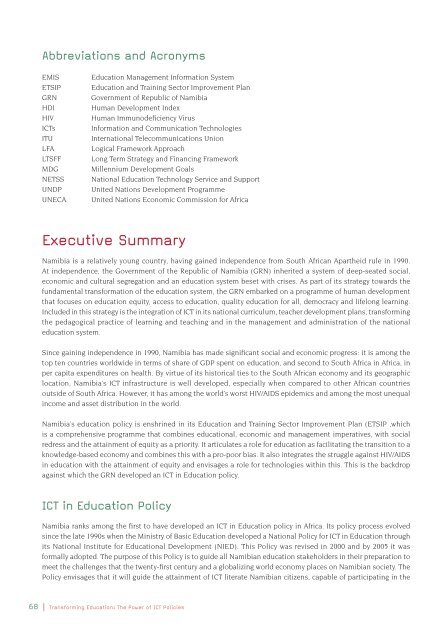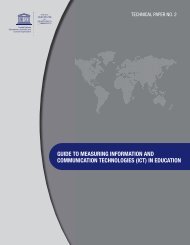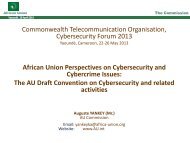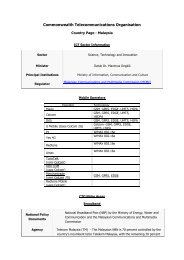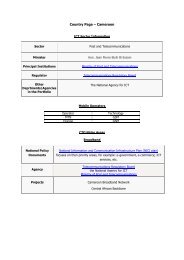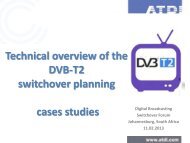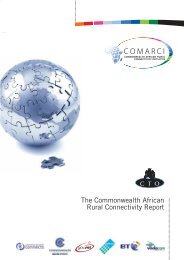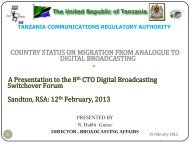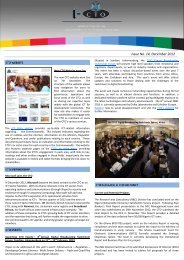Transforming education: the power of ICT policies - Commonwealth ...
Transforming education: the power of ICT policies - Commonwealth ...
Transforming education: the power of ICT policies - Commonwealth ...
Create successful ePaper yourself
Turn your PDF publications into a flip-book with our unique Google optimized e-Paper software.
Abbreviations and Acronyms<br />
EMIS Education Management Information System<br />
ETSIP Education and Training Sector Improvement Plan<br />
GRN Government <strong>of</strong> Republic <strong>of</strong> Namibia<br />
HDI Human Development Index<br />
HIV Human Immunodefi ciency Virus<br />
<strong>ICT</strong>s Information and Communication Technologies<br />
ITU International Telecommunications Union<br />
LFA Logical Framework Approach<br />
LTSFF Long Term Strategy and Financing Framework<br />
MDG Millennium Development Goals<br />
NETSS National Education Technology Service and Support<br />
UNDP United Nations Development Programme<br />
UNECA United Nations Economic Commission for Africa<br />
Executive Summary<br />
Namibia is a relatively young country, having gained independence from South African Apar<strong>the</strong>id rule in 1990.<br />
At independence, <strong>the</strong> Government <strong>of</strong> <strong>the</strong> Republic <strong>of</strong> Namibia (GRN) inherited a system <strong>of</strong> deep-seated social,<br />
economic and cultural segregation and an <strong>education</strong> system beset with crises. As part <strong>of</strong> its strategy towards <strong>the</strong><br />
fundamental transformation <strong>of</strong> <strong>the</strong> <strong>education</strong> system, <strong>the</strong> GRN embarked on a programme <strong>of</strong> human development<br />
that focuses on <strong>education</strong> equity, access to <strong>education</strong>, quality <strong>education</strong> for all, democracy and lifelong learning.<br />
Included in this strategy is <strong>the</strong> integration <strong>of</strong> <strong>ICT</strong> in its national curriculum, teacher development plans, transforming<br />
<strong>the</strong> pedagogical practice <strong>of</strong> learning and teaching and in <strong>the</strong> management and administration <strong>of</strong> <strong>the</strong> national<br />
<strong>education</strong> system.<br />
Since gaining independence in 1990, Namibia has made signifi cant social and economic progress: it is among <strong>the</strong><br />
top ten countries worldwide in terms <strong>of</strong> share <strong>of</strong> GDP spent on <strong>education</strong>, and second to South Africa in Africa, in<br />
per capita expenditures on health. By virtue <strong>of</strong> its historical ties to <strong>the</strong> South African economy and its geographic<br />
location, Namibia’s <strong>ICT</strong> infrastructure is well developed, especially when compared to o<strong>the</strong>r African countries<br />
outside <strong>of</strong> South Africa. However, it has among <strong>the</strong> world’s worst HIV/AIDS epidemics and among <strong>the</strong> most unequal<br />
income and asset distribution in <strong>the</strong> world.<br />
Namibia’s <strong>education</strong> policy is enshrined in its Education and Training Sector Improvement Plan (ETSIP ,which<br />
is a comprehensive programme that combines <strong>education</strong>al, economic and management imperatives, with social<br />
redress and <strong>the</strong> attainment <strong>of</strong> equity as a priority. It articulates a role for <strong>education</strong> as facilitating <strong>the</strong> transition to a<br />
knowledge-based economy and combines this with a pro-poor bias. It also integrates <strong>the</strong> struggle against HIV/AIDS<br />
in <strong>education</strong> with <strong>the</strong> attainment <strong>of</strong> equity and envisages a role for technologies within this. This is <strong>the</strong> backdrop<br />
against which <strong>the</strong> GRN developed an <strong>ICT</strong> in Education policy.<br />
<strong>ICT</strong> in Education Policy<br />
Namibia ranks among <strong>the</strong> fi rst to have developed an <strong>ICT</strong> in Education policy in Africa. Its policy process evolved<br />
since <strong>the</strong> late 1990s when <strong>the</strong> Ministry <strong>of</strong> Basic Education developed a National Policy for <strong>ICT</strong> in Education through<br />
its National Institute for Educational Development (NIED). This Policy was revised in 2000 and by 2005 it was<br />
formally adopted. The purpose <strong>of</strong> this Policy is to guide all Namibian <strong>education</strong> stakeholders in <strong>the</strong>ir preparation to<br />
meet <strong>the</strong> challenges that <strong>the</strong> twenty-fi rst century and a globalizing world economy places on Namibian society. The<br />
Policy envisages that it will guide <strong>the</strong> attainment <strong>of</strong> <strong>ICT</strong> literate Namibian citizens, capable <strong>of</strong> participating in <strong>the</strong><br />
68 | <strong>Transforming</strong> Education: The Power <strong>of</strong> <strong>ICT</strong> Policies


